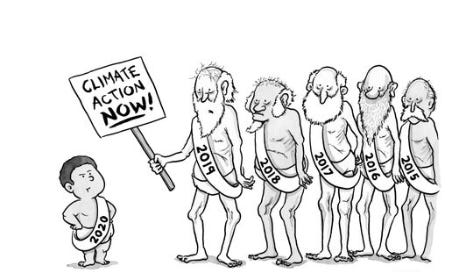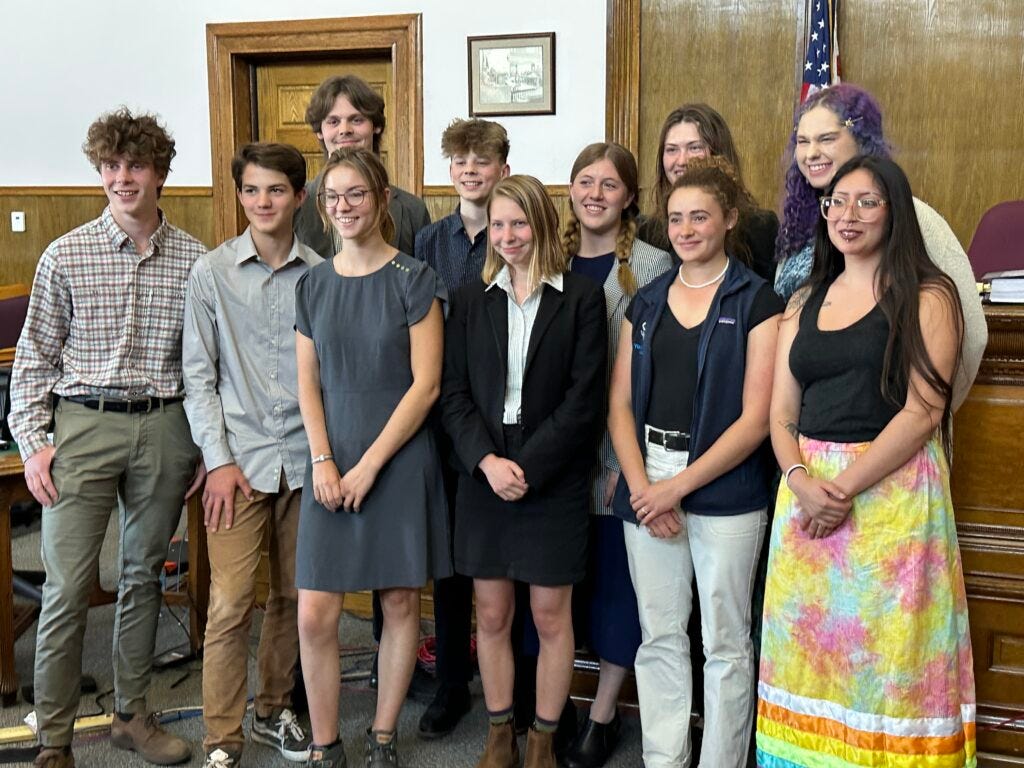Extracted/English version - Fall 2024 - Environmental Urgency: Child's Play?
International readers : this post is for you. French-speaking subscribers, we advise that you switch to the French version: https://exfiltrees.substack.com/
Ever heard of “Gretaphobia”? Coined by French social sciences professor Philippe Watrelot, the term refers to the virulent attacks aimed at the young Swedish activist. Between 2018 and 2023, Greta Thunberg's "Fridays for Future" mobilised thousands of young people worldwide. In France, the "Youth for Climate" movement orchestrated numerous strikes, often accompanied by acts of "civil disobedience".
While the proliferation of youth-led activism irks some—who deem these actions radical or even counterproductive—others contend that the young generation is indeed an essential component of the solution.
As World Children's Day approaches on November 20th, our fall edition grapples with pressing questions: What environmental legacy are we transmitting to our children? What challenges await the "Z" and "alpha" generations? Can we genuinely speak of a "Climate Generation", as the press often does, and if so, what is their room for manoeuvre?
What to expect in this issue:
In-depth : Environmental Urgency: Child's Play?
From Knowledge to Action : How to address climate change with children
Podcast of the Month : Trump in the House - end of the climate game?
IN-DEPTH💡: Horizon 2050: A New World
At a recent conference at the French Climate Academy, Yamina Saheb, co-author of the IPCC Group 3 report and a senior policy analyst in energy efficiency, offered a stark response to the seemingly innocuous question, "How are you?": "Not well. For our children—mine, yours, those born in the 2020s—the chances of having a life expectancy similar to their grandparents are virtually nil."
Depending on one's perspective, this assertion might be perceived as:
1- Depressing (“Our children won't have even a tenth of the luck we had in a world with seemingly inexhaustible physical limits”)
2 - Oddly comforting (“Phew! At least they'll avoid the nursing home”)
3 - Irrelevant (“It's the children in the Global South who will be affected, it's sad for them but ours will age in the same conditions as us”)
The facts paint a grim picture:
A child born today will inhabit a world 4°C warmer than pre-industrial averages, compared to about 1.5°C today. The climate change curve is exponential, with tipping points and a cascade of potentially devastating natural disasters. The consequences will manifest across multiple domains: health, food security, and life expectancy.
Some sobering statistics:
According to certain studies, for each degree Celsius increase in temperature, life expectancy decreases on average by about 0.44 years. Obviously, we're talking about averages here, with very significant disparities between the most exposed populations and others.
By 2050, more than 2 billion children will be exposed to frequent and intense heat waves, regardless of the greenhouse gas emission scenario envisaged1 Children will suffer most the most from climate-exacerbated communicable diseases, such as cholera and malaria.
Beyond health issues, malnutrition – which already affects 1 in 4 children in the world today – will continue to be aggravated by climate change if our food and agricultural system is not fundamentally rethought.
Climate disasters will also lead to massive displacements. By 2050, it is predicted that up to 216 million people could be forced to migrate due to the effects of climate change, the majority of whom will be women and children (nearly 43.1 million children are officially recognized today as climate refugees).
In this context, it is hardly surprising that a segment of youth succumbs to anxiety. The question remains: how will this generation navigate the choppy waters of climate change, and what role will they play in shaping the future?
Rebels with a cause?
A generational divide is emerging on environmental concerns, with polls consistently showing that 15-25 year-olds are more preoccupied with ecological issues than their parents.
The latter tend to focus on short-term matters, exemplifying Mark Carney's "tragedy of the horizon" concept. A comprehensive study by French Governmental Agency Ademe on thousands of young people between 2020 and 2022 found that 79% of respondents place "great importance" on the environment, compared to 68% of their parents and 53% of their grandparents.
This "eco-anxiety" is not just about teenage angst. It is also a rather logical reaction to looming societal and ecological challenges (you can read more about this topic in our March issue “50 nuances of eco-emotions”).
What surveys shows, however, is that negative emotions associated to eco-anxiety—anger, sadness, despair—appear more acute among the young. A survey of 10,000 16-25 year-olds across ten countries, published by The Lancet Planetary Health, revealed that 45% report eco-anxiety affecting their daily lives, with nearly three-quarters viewing the future as frightening. The study notes that negative emotions are overrepresented among youth, women, and those most vulnerable to climate events.
What is the impact of this trend on how young people react and envision their future?
A spectrum of reactions
The resigned
The Ademe's referenced above portrays 15-25 year-olds as fatalistic, believing the opportunity to reverse climate change trends has passed. This pessimism has spawned movements like "Conceivable Future" in the US, "No Future No Children" in Canada, and "Birthstrike" in the UK. These groups advocate childlessness or reduced procreation as a means of raising awareness and spurring action, rather than population control.
A 2023 University College London study corroborates this trend, finding that those most concerned about climate change express desires for fewer children or none at all.
The activists
Countering resignation, the past decade has witnessed new forms of youth activism. From litigation to civil disobedience, engagement trajectories are diverse:
The judicial route has seen notable successes2, such as the recent landmark victory of 16 American children and adolescents against the state of Montana. The judge ruled unconstitutional a law prohibiting consideration of greenhouse gas emissions' climate impact in fossil fuel company permit approvals.
Eleven of the sixteen young plaintiffs in the Held v. Montana case pose for a photo on June 16, 2023 (Blair Miller/Daily Montanan)
Civil disobedience, once the domain of fringe radicals, has become increasingly mainstream among young activists. From site occupations to headline-grabbing stunts like throwing paint on artworks, these actions have proliferated and many perceive them as counter-productive. But contrary to popular belief, such tactics often aim not to sway public opinion directly, but to expand the Overton window of acceptable discourse, thereby bolstering acceptability and support for more moderate measures. (We recommend reading this excellent article to find out more.)
Students and young professionals network.
In France, the radical graduation speech delivered by students from tier-1 engineering school AgroParisTech, urging peers to "bifurcate" from traditional career paths, made a lasting impact. Ecological associations are burgeoning across campuses, with HEC Transitions and ESCP Transition Network leading the charge. The "Ecological Manifesto" movement, encapsulating student demands, has garnered over 30,000 signatures. Employee networks are also coalescing both within and across corporate boundaries, signaling a shift in workplace activism (see our dedicated January 2024 newsletter).
The pragmatists
While many attribute the responsibility for change to younger generations and applaud their "bifurcation" and engagement, the reality is that young graduates still prioritize security (salary, benefits, prospects of high income) over ecological impact.
Numerous surveys demonstrate this trend. In addition to the aforementioned Ademe study, which notes that "despite the commitment they proclaim, the description of their lifestyle by the young people interviewed does not indicate major changes to impact the environment," we can also cite this survey3 conducted among 30,000 students from top business and engineering schools in 2023. It shows that 55% of the students surveyed (-4% vs 2022) were willing to work for a company that doesn't align with their values if the salary was higher - compared to 39% (+12) who, conversely, would be ready to refuse such employment.
"What can we deduce from this?", French engineer and consultant Jean-Marc Jancovici recently wrote, "That we must be careful not to jump to conclusions, and that a few swallows (the committed speeches within some “grandes écoles”, or some emblematic activist figures) are far from representative."
One of the specificities highlighted by this same survey allows us to better understand the trend of individualism and how to transform it into positive action: 83% of the young people surveyed believe that "we have failed to take care of the planet." More specifically, the level of distress is higher among those who observe the inadequacy of government responses, feeling a sense of betrayal.
So how can we help young people overcome their anger and recognize their capacity to act without imposing on them the burden of change?
Liked this article? Share it!
From Knowledge to Action 🙋♂️: How to Adress Climate Change
One useful first step is introspection:
What would your childhood self think of the adult you've become?
How will your children/nieces/nephews judge your actions when they reach your age?
Then we can tailor approaches according to age groups:
👶For the youngest (under 10 years old): explain and reassure
According to Laelia Benoit, a child psychiatrist and researcher at Yale University on the subject of eco-anxiety in young people, we should not try to explain facts and projections to young children before 10-12 years old, because "their minds do not perceive all the large-scale issues."
Instead, it's about reassuring them by proposing concrete actions, because eco-gestures that may seem insignificant to us represent a lot on a child's scale: we can compost, plant a tree, sort waste or better yet, go pick it up. This will allow them to overcome anxiety by feeling useful.
👧 With teenagers: inform, communicate and involve
The studies conducted by French governmental agency Ademe show that young people are eager for information on environmental subjects, with a preference for content produced by influencers providing "a positive light on the crisis (...) and perspectives on how to fight against climate change." (Some of the young people interviewed denounce the angle of treatment by traditional media, which they consider too anxiety-inducing).
Teenagers' anger or despair in the face of the general lack of action will be significantly mitigated by communication, but especially by seeing that parents share the child's concerns and above all act and engage accordingly. Thus, the Ademe study emphasizes that young people favor "intergenerational dialogue".
To avoid judgments and disappointments in the face of actions that may be perceived as insufficient, family members can help young people by offering them informative content but also by involving them in the discussion on actions to be taken within the family, whether it's about choosing vacation destinations, food, or daily travel.
To raise awareness, consider Climate Fresk workshops (junior format between 10 and 14 years old) or 2tonnes Workshops (from 16 years old)
💚Podcast of the month : Trump in the House - end of the climate game?
Following major geopolitical developments this week, we recommend listening to the latest episode of Bloomberg's Zero podcast.
Several climate experts share their analysis on how the future Trump administration is likely to shape our energy future. They suggest that the outlook may not be as clear-cut as some commentators predict. "Drill Baby Drill" will not be the only issue at stake.
Liked this issue of Extracted? Subscribe here!
The coldest year of the rest of their lives - UNICEF
The number of climate-related legal cases doubled between 2017 and 2022. As we discussed in a previous newsletter (November 2023: Good COP or Bad COP?), among the deluge of climate lawsuits, many remain unresolved. Nevertheless, these trials also have numerous significant impacts, including an evolution of the law, media coverage, and financial repercussions.
"For the first time in U.S. history, a court has ruled that a government has violated children's constitutional rights through laws and actions promoting fossil fuels and ignoring climate change," Julia Olson, executive director of Our Children's Trust, one of the legal associations supporting the plaintiffs, said in a statement.








